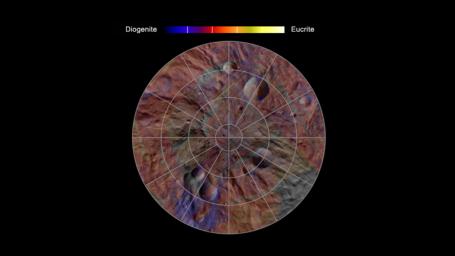
|
Mineral Diversity at Vesta’s South Pole
- Click the image above for a larger view
- Full-Res JPEG (1280 x 720) (59.2 kB)
- Full-Res TIFF (1280 x 720) (2.8 MB)
Caption:
This image, made from data obtained by NASA's Dawn spacecraft, shows the mineral distribution in the southern hemisphere of the giant asteroid Vesta. The mineral data came from Dawn's visible and infrared mapping spectrometer, which captures different wavelengths of reflected and emitted radiation. The areas in purple have a higher proportion of diogenite minerals, and yellow areas have a higher proportion of eucrite minerals. Diogenites are silicate rocks with more magnesium than the eucrites, which are richer in iron. The mineral data lies on a mosaic obtained by Dawn's framing camera.
The small-scale variation and the fact that mixtures of diogenite and eucrite appear all over Vesta suggest a complex crust dominated by eucrite with intrusions of diogenitic materials. However, since diogenites appear in greater proportion at depth, the patterns suggest Vesta likely melted all the way through early in its evolution.
The data used to create this image were obtained in August 2011, during Dawn's survey phase (on average 1,700 miles or 2,700 kilometers above the surface).
Background Info:
The Dawn mission to Vesta and Ceres is managed by NASA's Jet Propulsion Laboratory, a division of the California Institute of Technology in Pasadena, for NASA's Science Mission Directorate, Washington. UCLA is responsible for overall Dawn mission science. The visible and infrared mapping spectrometer was provided by the Italian Space Agency and is managed by the Italy's National Institute for Astrophysics, Rome, in collaboration with Selex Galileo, where it was built.
More information about Dawn is online at http://www.nasa.gov/dawn and http://dawn.jpl.nasa.gov .
Cataloging Keywords:
| Name | Value | Additional Values |
|---|---|---|
| Target | 4 Vesta | |
| System | Main Belt | |
| Target Type | Asteroid | |
| Mission | Dawn | |
| Instrument Host | Dawn | |
| Host Type | Orbiter | |
| Instrument | Framing Camera (FC) | Visible and Infrared Spectrometer (VIR) |
| Detector | ||
| Extra Keywords | Color, Infrared | |
| Acquisition Date | ||
| Release Date | 2012-05-10 | |
| Date in Caption | ||
| Image Credit | NASA/JPL-Caltech/UCLA/INAF/MPS/DLR/IDA | |
| Source | photojournal.jpl.nasa.gov/catalog/PIA15661 | |
| Identifier | PIA15661 | |
